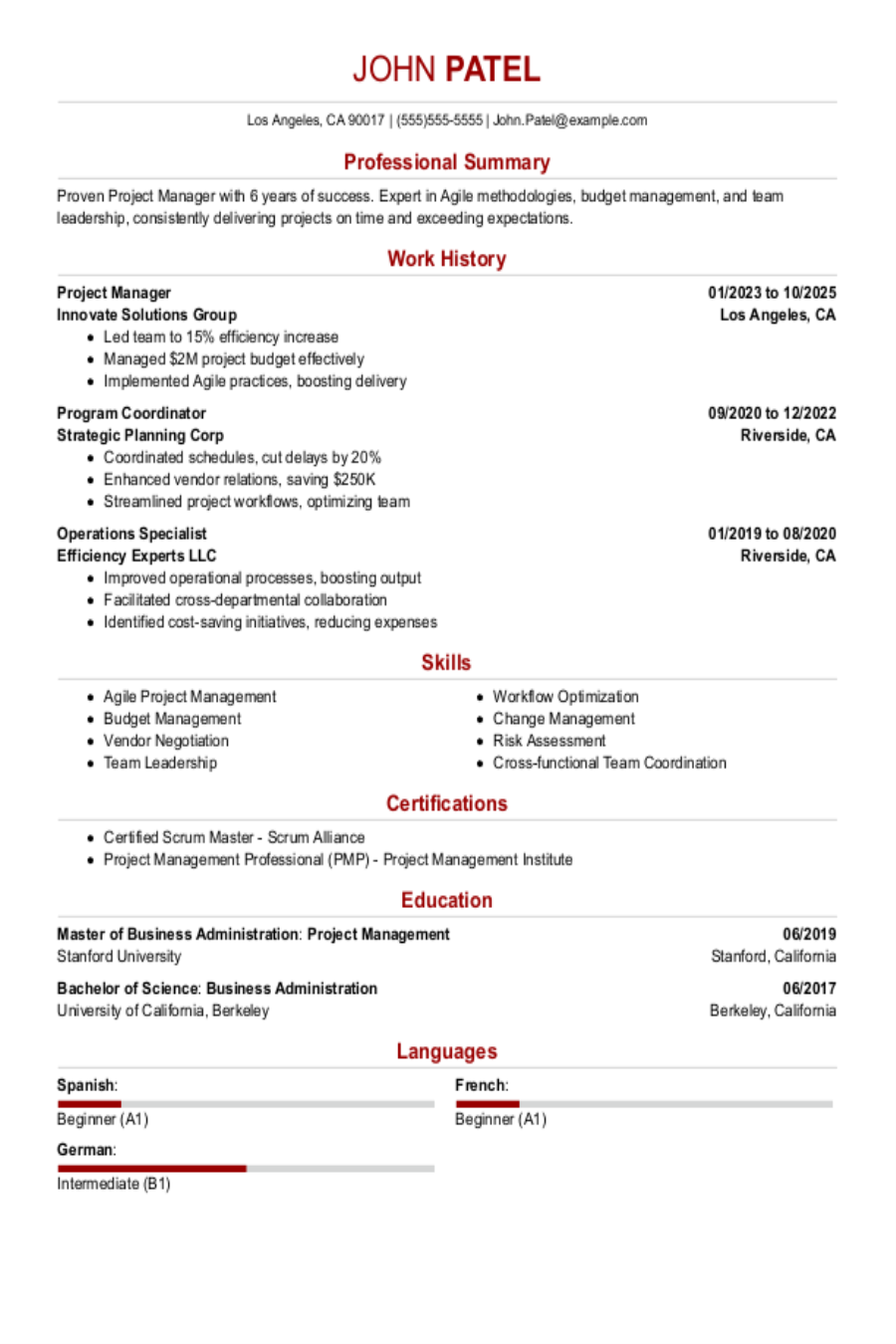Popular Real Estate Resume Examples
Entry-level real estate resume
An entry-level resume for real estate should focus on relevant coursework, internships, certifications, and essential skills like negotiation, communication, and market analysis to demonstrate capability.
Prioritizes readability: Opting for a clean resume design, such as a simple resume template, helps job seekers present their qualifications clearly. This approach makes it easier for recruiters to quickly assess their experience and skills.
Places skills over experience: Using a functional resume format is strategic for this applicant as it spotlights their key achievements in property management and sales, such as increasing sales by 20%, rather than merely listing job titles.
Mid-career real estate resume
A mid-career real estate professional's resume should emphasize a combination of industry experience, key skills in negotiation and sales, and evidence of ongoing professional development to attract potential employers.
Balances skills and experience: This applicant's resume effectively showcases a mix of technical skills in property sales and management while highlighting a clear progression from assistant property manager to real estate agent, underscoring their professional growth.
Employs active language: Action verbs like "increased," "closed," and "implemented" highlight proactive efforts and significant achievements, showcasing the applicant's ability to drive results in real estate.
Experienced real estate resume
An experienced real estate resume should prioritize highlighting notable sales achievements and growth in responsibilities to clearly demonstrate the applicant's value in the industry.
Embraces modern design: This dynamic real estate professional excels in high-stakes negotiations and client relations, driving sales growth while managing diverse properties. Using a modern resume template helps showcase this candidate's innovative approach.
Follows traditional format: Using the chronological resume format effectively highlights this job seeker's extensive experience. It clearly illustrates career growth and accomplishments, allowing potential employers to track their professional journey at a glance.
No experience real estate resume
A resume for an applicant with no experience in real estate should emphasize relevant skills, education, and any volunteer work to demonstrate their potential and enthusiasm for the industry.
Avoids jargon: Job seekers often feel the urge to embellish their experiences with complex terms or vague descriptions. However, this resume clearly outlines the candidate's responsibilities and achievements to to create a stronger career narrative.
Overcomes lacking experience: Incorporating volunteer work experience highlights the job seeker's foundational knowledge, helping to address the gap caused by limited professional experience in the field.
More resume examples
Real Estate Resume Template
Looking to create a standout application? Use this real estate resume template as a solid base—just personalize it with your unique details and experiences.
Michael Kim
Newark, NJ 07105
(555)555-5555
Michael.Kim@example.com
Professional Summary
Experienced Real Estate Consultant with 7 years within the sector, skilled in client relations, market analysis, and property management. Proven track record in sales growth and innovative strategies.
Skills
- Real Estate Market Analysis
- Property Management
- Client Relations
- Financial Reporting
- Marketing Strategies
- Portfolio Management
- Legal Compliance
- Negotiation
Certifications
- Certified Property Manager (CPM) - Institute of Real Estate Management
- Real Estate Investment Certificate - National Association of Real Estate
Education
Master of Business Administration Real Estate
University of California, Berkeley Berkeley, California
June 2018
Bachelor of Science Finance
University of Oregon Eugene, Oregon
June 2016
Work History
Real Estate Consultant
Future Residences - Newark, NJ
January 2023 - November 2025
- Increased client base by 30% in two years
- Facilitated property sales over $5M annually
- Developed marketing strategies for urban housing
Property Manager
Greenfield Estates - Jersey City, NJ
January 2020 - December 2022
- Managed over 50 units, reducing vacancies by 20%
- Implemented cost-saving measures decreasing expenses by 10%
- Coordinated tenant relations and ensured legal compliance
Real Estate Analyst
Vista Horizon Realty - Maplewood, NJ
November 2018 - December 2019
- Analyzed market trends, aiding in 15% ROI increase
- Prepared financial reports for property valuations
- Assisted in portfolio management for commercial assets
Languages
- Spanish - Beginner (A1)
- Mandarin - Intermediate (B1)
- French - Beginner (A1)
Writing Your Real Estate Resume
Now that you've explored these compelling real estate resume examples, it’s time to dive into the details of how to write a resume. We’ll walk you through each section step by step, ensuring you craft a standout application.
List your most relevant skills
An effective skills section for your real estate resume should focus on both hard skills, like market analysis and property management, and soft skills, such as negotiation and customer service. By showcasing these abilities, you demonstrate your readiness to excel in the role.
To maximize impact, incorporate keywords from the job listing into your skills section. This approach not only helps human recruiters understand your fit for the position but also improves your chances with applicant tracking systems.
Example of skills on a real estate resume
- Proficient in analyzing property market trends and data for informed decision-making
- Adept at negotiating contracts and securing favorable terms
- Strong communicator with a focus on client satisfaction and relationship building
- Organized with exceptional time management skills to handle multiple transactions efficiently
Highlighting your soft skills on your resume is essential. Employers often look for interpersonal abilities because they are challenging to develop, and showcasing these traits can set you apart from other job seekers.
Highlight your work history
Your work experience section should highlight your achievements and demonstrate how you have applied your skills in practical situations. By focusing on specific results and incorporating relevant keywords, you can capture the attention of hiring managers who are looking for job seekers with proven success.
Each job entry should include essential information such as your job title, the name of the employer, and the dates of employment. This clarity not only establishes your professional credibility but also helps employers quickly identify your career background.
Example of a real estate work experience entry
- Real Estate Agent
Dream Homes Realty - Miami, FL
January 2019 - Present - Facilitate the sale and purchase of over 50 residential properties annually, consistently achieving a client satisfaction rate of 97%
- Conduct market analysis to accurately assess property values and negotiate competitive offers, resulting in a 10% increase in successful closings
- Develop and maintain strong client relationships through effective communication and personalized service, leading to a 20% increase in referrals year-over-year
- Use innovative marketing strategies including social media and virtual tours to improve property visibility, increasing inquiries by 15%
- Collaborate with mortgage brokers, inspectors, and attorneys to ensure seamless transaction processes, reducing average closing time by 12%
Quantifying achievements in real estate allows you to clearly showcase your impact. For example, stating that you increased property sales by 20% within a quarter demonstrates your ability to drive results and effectively manage client relationships.
Include your education
The education section of your real estate resume should showcase your academic achievements in reverse-chronological order, starting with your most recent degree. Include all relevant diplomas and degrees while omitting your high school diploma if you have a higher qualification like a bachelor's degree or above.
For those currently pursuing education or holding incomplete degrees, listing the highest achieved level along with an expected graduation date is important. You may include bullet points detailing significant coursework or academic accomplishments, which can be especially useful for recent graduates or current students.
Common certifications for a real estate resume
- Real Estate License – State Real Estate Commission
- Certified Residential Specialist (CRS) – Council of Residential Specialists
- Accredited Buyer’s Representative (ABR) – National Association of Realtors (NAR)
- Graduate, Realtor Institute (GRI) – National Association of Realtors (NAR)
Sum up your resume with an introduction
Your resume profile plays a important role in creating an compelling first impression as a real estate professional. It serves as a concise introduction to your career, highlighting the value you bring to a prospective employer.
If you are an experienced applicant, consider using a professional summary. This format allows you to showcase key accomplishments and competencies that align with the job you're targeting. By placing these achievements at the top of your resume, hiring managers can quickly assess your suitability for the role.
If you’re just starting out, write a goals-oriented resume objective that highlights your commitment to building your career.
Professional summary example
Dynamic real estate professional with over 10 years of experience in residential and commercial markets. Recognized for successfully closing high-value transactions and improving client relationships through exceptional negotiation skills and market analysis. Proficient in property valuation, contract management, and strategic marketing initiatives that drive sales growth.
Resume objective example
Enthusiastic real estate professional eager to use strong communication, negotiation, and market analysis skills to support a thriving real estate team. Committed to fostering client relationships and driving successful transactions while continuously learning and growing in the industry.
In your resume profile, start with your job title to quickly convey your professional identity. This approach, whether you opt for a professional summary or an objective statement, helps employers instantly understand who you are and the value you bring to the table.
Add unique sections to set you apart
Including optional resume sections in your real estate application can highlight your unique qualifications as a job seeker. These sections allow you to showcase skills and experiences that set you apart from the competition.
By adding relevant hobbies or volunteer work, you give potential employers insight into your values and work ethic. For instance, participating in community service could reflect your commitment to helping others, while real estate-related activities demonstrate your passion for the industry.
Three sections perfect for a real estate resume
- Languages: In real estate, building rapport with clients is essential. If you speak different languages, make sure to highlight these language skills on your resume to appeal to a broader clientele and improve communication.
- Volunteer Work: Including volunteer work on a resume showcases your dedication to community service and improves your professional skills. By demonstrating your commitment to helping others, you become a more appealing job seeker to potential employers.
- Accomplishments: In real estate, quantifiable accomplishments are important for proving your market impact. Emphasize these achievements within your work history or by crafting a dedicated accomplishments section.
5 Resume Formatting Tips
- Choose a format that matches your career stage.
Choosing the right resume format is important for showcasing your experience. If you have a wealth of experience, opt for a chronological layout to highlight your career progression. For those just starting, a functional style can emphasize skills over work history. You might also consider a combination approach to present both effectively.
- Pick a smart resume template.
Using a professional resume template improves readability and ensures your qualifications stand out. It allows you to present information clearly, making it easier for hiring managers to quickly assess your skills. If you prefer a custom format, keep it straightforward with clean lines and ATS-friendly fonts for the best results.
- Select an appropriate font.
Choosing a professional font significantly improves the readability of your resume. Fonts such as Helvetica, Georgia, or Verdana are excellent choices that ensure compatibility with ATS systems while being easy for hiring managers to read.
- Use consistent formatting.
Align your resume text to the left with uniform margins. This creates a clean, organized look that improves your professional image and readability.
- Keep your resume to one or two pages.
When outlining your resume, remember that resumes should be one page long. If you have extensive experience, a second page may be acceptable. Ensure that every word counts and focuses on what truly matters to showcase your qualifications.
Tools for Your Job Search
Are you gearing up to apply for that exciting real estate position? Before you hit submit, consider using our ATS Resume Checker. This essential tool provides insights on how well your resume performs with the automated systems that many real estate firms use for initial job seeker screening.
Looking to improve your application further? Our AI Resume Builder offers customized content recommendations tailored specifically to your real estate background. With professionally designed templates at your fingertips, you can effectively showcase your achievements and qualifications to stand out to hiring managers.
Frequently Asked Questions
Last Updated: November 24, 2025
Yes, a cover letter is important because it adds depth to your resume and allows you to communicate directly with potential employers. It’s your opportunity to express why you are passionate about the real estate role and how your unique experience makes you an excellent fit. So, don’t hesitate—write a cover letter that highlights your qualifications and enthusiasm.
For a quick solution, try our AI Cover Letter Generator! It helps you create tailored cover letters in just minutes, offering various cover letter template options that match your resume perfectly, ensuring consistency and professionalism in your application materials.
A resume is typically concise, ranging from one to two pages, focusing on your relevant work experience and skills. In contrast, a curriculum vitae (CV) can extend several pages, offering detailed insights into your academic background, research contributions, publications, and extensive professional experiences.
You should use a CV when applying for positions in academia or specialized fields like law and medicine. If you need help creating a standout CV, our online CV Maker is here for you. With a variety of CV templates tailored to different industries and career levels, you can easily craft a professional document that showcases your qualifications in just minutes.
Selecting the right resume format is important for showcasing your qualifications effectively. Inexperienced applicants often benefit from a functional format, which highlights relevant skills over work history. Conversely, seasoned professionals should opt for a chronological format that shows their extensive experience. For those in mid-level positions, a combination format serves as an ideal middle ground, illustrating both skills and career progression seamlessly.
A frequent resume error made by real estate professionals is failing to use a resume template that's ATS-friendly. To improve your chances of getting noticed, use a simple template and tailor your resume to align with the specific job description you're applying for. This can make a significant difference in your application process.
Maintaining an active LinkedIn profile is important for a real estate job search. It helps you connect with industry professionals and effectively highlight your unique skills and experiences.
Was this information helpful? Let us know!
Keith is a Certified Professional Resume Writer (CPRW) and trusted media source in the career industry with over a decade of experience helping job seekers stand out.
More resources

Bad Cover Letter Examples: How To Fix Those Annoying Mistakes
Check out four sample cover letters and then learn from a pro...
![Communication Skills for Your Resume [40+ Examples and How to Improve Them] Communication Skills for Your Resume [40+ Examples and How to Improve Them]](/sapp/uploads/2025/08/Communication-skills.png)
Communication Skills for Your Resume [40+ Examples and How to Improve Them]
Good communication skills can propel your personal and profess...

How to List Language Skill Levels on Your Resume
Language skills give you an instant advantage in the job marke...



